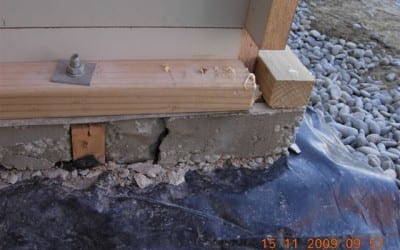The average construction business in New Zealand has less than 3 employees, which means the building industry here is rich with small “Mum & Dad” and “one man band” operators running their own small businesses.
Most of these businesses start when a builder, sparky or other trade professional, for a whole range of reasons, decides to go out on their own after first working for someone else for a few years. But is your training and experience suitable when it comes to running a business? In this article we outline the insurance basics you need to consider before going out on your own for the first time.
Have a Risk Management Framework
Running any kind of business involves a certain degree of risk, and building is no exception. Indeed, builders face additional responsibilities placed on them by the Building Act, such as disclosure requirements, mandatory contract terms and implied warranties. The same applies to electricians under Electricity (Safety) Regulations, EWRB rules. These responsibilities can be overwhelming without the right skills, support and systems in place. A risk management framework is a good place to start to identify the potential risks you face. It’s then much easier to get a handle on and deal with them. This makes for a happier, less stressful time because you understand and can proactively manage the risk environment you’re working in.
4 Areas of Risk
Here at Builtin we talk about 4 areas of risk:
Assets – the stuff you own that helps you do business
Financial – the money your customers owe you
Liability & Indemnity – the responsibility you have to and for others and their property
Personal – the potential for accident/illness to affect your income earning capacity
Under each of these headings, list the potential risks you face and write next to each one what you can do to eliminate, minimise or transfer (ie. insure) this risk. Most of you will be familiar with this approach because you’re doing it for health & safety already. You can then rank each item by giving it two scores: the likelihood of it happening and the cost to you if it did. Multiply both numbers together and rank your list on this score. The items with the highest scores are the ones you need to address most urgently. This is a good exercise for any business to run on a regular basis.
Example Risk Management Framework
| Description of risk* | Likelihood of it happening (2= lowest, 6=highest) | Cost if it did happen (2=lowest, 6=highest) | Total (multiply then rank) |
| Assets | |||
| Tools stolen | 3 | 2 | 6 |
| Financial | |||
| Main contractor goes bust | 2 | 3 | 6 |
| Liability & Indemnity | |||
| Legal dispute with client | 2 | 5 | 10 |
| Personal | |||
| Get skin cancer | 2 | 4 | 8 |
*This is an example only
Insurance Basics Checklist
In terms of the package of insurance cover available for new building & trade businesses there are a few options to consider. What you insure for will depend ultimately on your own “risk appetite”, what you’re prepared to take a punt on and what you’re not. As a small, new business you’re probably running a business while still on the tools, as well as managing projects involving other trades, suppliers and professionals. You need to make sure your insurance cover reflects all these aspects of what you do.
1. ACC Cover Plus Extra & Illness/Loss of Earnings
As a self employed person you’ll be responsible for paying your own ACC levies. Tradies are advised to switch from the standard ACC plan (called Cover Plus) to ACC Cover Plus Extra and combine this with private loss of earnings/income protection insurance. Done correctly this will substantially broaden your protection to include illness as well as accidental injury, for a similar overall cost. Even in the construction industry you’re significantly more likely to be off work through illness than injury, so this is an important issue to get sorted, for you and your family.
2. Public Liability
This is essential cover for builders & trade businesses, because there is always a risk that you or one of your workers or subcontractors, could cause damage to someone else’s property. Liability insurance and the claims that arise can be complicated, so make sure you spend a bit of time understanding the cover and the options that are available (like statutory liability, employers liability and defective workmanship cover). Deciding what limit of liability you need (eg. $1m, $2m, $5m etc) depends on things like:
- Whether you’re contracting to someone who requires you to have a particular level of cover
- The type of structures you’re working on and around. Eg. large commercial buildings, built up residential areas, isolated rural locations etc
- Other potential risks, such as the lost income from businesses that have to stop trading if you accidentally set off a sprinkler system, cut a power cable or dig up a water pipe for example
3. Errors & Omissions Indemnity (Professional Indemnity)
While public liability covers you for accidental physical damage and loss of property (and in some cases injury), it will not cover your liability for mistakes that cause no physical damage but do result in a financial cost to your client (or another party). For example, not following a specification or plan correctly, a foundation that is laid out wrong or a subcontractor failing to do their job properly . For this you will need Errors & Omissions Indemnity.
4. 10 Year Builders Guarantees
An independently insured 10 year guarantee will give potential customers extra peace of mind and security when choosing you as their builder. Master Builders, NZCB members and Homefirst Guarantee Accredited Builders can provide these guarantees. The Homefirst Guarantee is independently insured and can be applied for by Building Hub members, builders and LBPs who first meet Builtin’s accreditation criteria. There is no cost to be accredited and no ongoing fee, you simply pay per guarantee.
5. Subcontractors Payment Guarantee
If you’re contracting to another company there’s a risk that if they go bust you won’t get paid for the work you’ve done. This is a real problem in the construction industry and can cause significant cashflow problems for small businesses. A Subcontractors Payment Guarantee will reimburse 75% of the money you’re owed, up to the limit you choose.
6. Contract Works Insurance
Contract works insurance covers the work being done for things like: theft, vandalism, fire, flood, storm, accidental damage and natural disasters. For builders starting out you’re probably doing small jobs, renovations and perhaps some minor alterations to existing buildings. In these cases it is typically the building owner who is responsible for arranging insurance. A labour only builder is also generally not responsible for arranging this insurance. Check your contract for who is responsible, if it’s your client make sure you see a copy of the insurance certificate before you start work, to make sure they actually did it and so you can check your name is on it too.
7. Tools & Equipment
Tools theft is rife at the moment and depending on how much kit you have, getting it insured is a sensible option. There is a wide range of cover available, from full replacement to market value only, and cover that includes burglary but not theft if there is no forced entry. Trailers need to be covered under a commercial vehicle policy, not a tools policy. Excesses can vary too, so consider what best suits your needs. And take care to keep your gear secure!
8. Commercial Vehicle
If you start using your private vehicle for work it may not be insured under your domestic vehicle policy for business use. You’ll need to swap it for a commercial vehicle policy instead.
9. Home Office
Check what cover your domestic house & contents policies include for home office use and equipment.
10. Other
Other cover is available for businesses with more complex needs, so if you think you might be doing something a bit out of the box we recommend you get in touch with a specialist trade insurer to discuss your situation.
In a nutshell
Managing risk is a critical part of running a successful business. A large, unforeseen and uninsured cost could take you down and seriously affect your future success, and the welfare of your family. Understanding the risk environment you work in can also make for a happier, less stressful working career too. Take some time to assess your own risk, talk to experienced professionals and put in place an insurance package that best suits the risks you face as both a trade professional and a trade business.




